Ed Frazier Davis has the Latin word “SOLVE” tattooed on the inside of his right arm, “COAGULA” on the left. “To take apart and to put back together,” said the 30-year-old composer, describing what has been called the Alchemist’s Motto: dissolve and re-coagulate. “Which is what we do as artists: We take the elements, and put back them together in various ways.”
We spoke at Ed’s home recently about the upcoming March 6th concert by the William Baker Festival Singers: a program devoted entirely to his music. It’s the sort of “homage” that composers ordinarily don’t get to experience until well into their careers. But then, there is really very little about Ed that you’d call ordinary.
The part that he will probably not tell you about, unless you ask him, is actually one of the more extraordinary aspects of his world: Both of his parents are really famous musicians. As he was growing up, it was not uncommon for Renée Fleming or Samuel Ramey or even Jeremy Irons to show up at the family home, but that didn’t faze Ed much. Even encounters with British royalty was not an uncommon part of his youth.
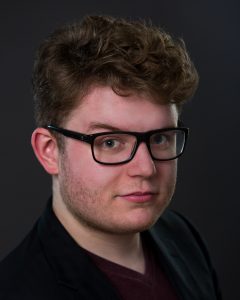
Ed Frazier Davis / Photo by Paul Crisanti
“I knew that what my parents did was special, but at the same time it was just their nine-to-five,” he said. It was only as he got older that he realized that his father, Sir Andrew Davis (who was knighted in 1999), was revered internationally as one of the greatest conductors of our time, and that his mother, Gianna Rolandi, was a world-famous soprano who ran the Lyric Opera of Chicago’s Ryan Opera Center for several years.
“It got more special as I came into music on my own,” said Ed, who moved with his family to Chicago from England as a 10-year-old. “And I began to know who these people were, and what they had achieved, and why what they had achieved was so special.” Still, he was often blasé about much of it, especially during his teenage years. “Though I was exposed to a lot of great stuff, I didn’t really appreciate it back then.” He remembers sitting through Chicago’s Ring of the Nibelung cycle at age 15 (Wagner’s 16-hour, four-evening operatic tetralogy), and even though his father was at the helm of the massive undertaking, Ed had to admit that … “well, I enjoyed it, but and there were a few moments when I almost fell asleep.”
Music was not even Ed’s initial career choice. But if he avoided entering his parents’ profession, it was because of “pressures and anxieties that were largely of my own making.” At Knox College in Illinois he majored in creative writing. “I just thought, why should I even try this whole music thing that my parents did? Because I’ll never be as successful as them.”
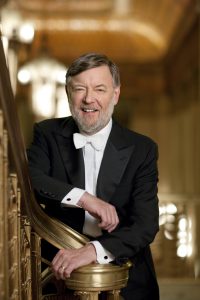
Sir Andrew Davis has led the Lyric Opera of Chicago since 2000 / Photo by Dario Acosta
Halfway through college, he changed his mind. “I was passionate about music, and I wanted to explore it, both as a career and as an element of my life. So I just went for it. But yeah, for many years, just worrying about ‘not being good enough’ was a big challenge.” Ed went on to major in music, and later earned a Master’s at Chicago’s Roosevelt University; he also pursued doctoral studies at the UMKC Conservatory, working with Chen Yi, James Mobberley, Zhou Long, Paul Rudy, and others. He has also studied choral conducting with Dorren Rao, and voice with his mother and with Sarah Moran, Stacey Tappan, Jim Collins, and Vinson Cole.
To be sure, Ed’s parents had always encouraged him to find his own path. “For a child of two talented musical parents, there’s a lot of pressure,” said Sir Andrew, who joined us on the phone from Chicago, where he has been music director of the Lyric Opera of Chicago since 2000. “Edward always had this fantastic sense of rhythm, and he has perfect pitch. … But he never took to an instrument, and at around 14 or 15 he said he was going to be an architect. … And then he found his way back to music, largely through his love of the choral repertoire.”
After several profound musical experiences singing in choirs (Ed also has a beautiful baritone voice), he began writing his own music: inspired, to some extent, by some of the works he performed (such as Frank Martin’s Double Mass). Somewhat to his surprise, people found the music quite good. Fast-forward to the summer of 2016: Ed and the Festival Singers’ founding director, William Baker, are talking about music over coffee.
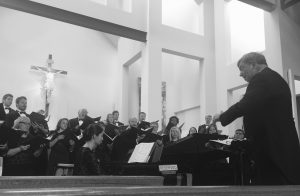
William Baker conducts the Festival Singers of Kansas City he founded in 1998
“I was so intrigued with his philosophy as a composer … about making ideas coming alive,” William said, adding that after an hour of conversing with Ed he decided to go with his gut. “I looked over and said, Ed, I would like for you to be our Composer-in-Residence. … He is now in his fourth season in this position, and this was one of the best moves our organization has made.”
Interestingly, at the time William didn’t even know who Ed’s parents were: He only knew this young man was one heck of a composer. “And having been a conductor for over 40 years, I can honestly say that Ed has earned everything that has come his own way completely on his own merits. I think he would be a rising-star composer even if he were not the son of Sir Andrew Davis.”
William was intrigued to learn later that Ed “had actually resisted the call” of music. “But the pull was too strong,” William said, adding that he believes this was a win-win for the music world. “Ed creates everything new. He plants each expressive idea in new soil. … The man has not composed a single piece that I would not program. He’s written eight or nine pieces for us, and each of them could be have been written by a different person. … Not only does he not sound like other composers, but each piece has its own sound.”
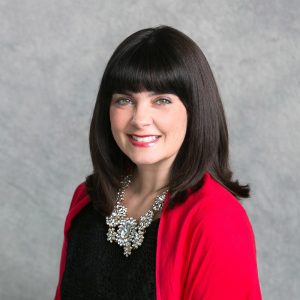
Soprano Sarah Tannehill Anderson performs Ed Frazier Davis’ new Hymn to Saint Cecilia
Sir Andrew echoed this sentiment, and though one can hear a proud father speaking, anyone will tell you that Davis père is not one to mince words or inflate egos.
“There’s a lot of choral music being written that, forgive me for saying this, tends to sound all the same,” Sir Andrew said with a laugh. “There are some well-known composers … who write well, but there tends to be a great similarity in everything they do. And I’ve never felt that way about Edward. In every piece that he writes, he’s looking at it … from a completely fresh point of view. He has a very recognizable style: one which has developed over the years, and is now very well established.”
Ed’s ongoing passion for literature and poetry has continually spurred his creative process. He loves setting texts, and has a very specific modus operandi for it. “I look at texts as being almost like architectural plans,” he said. “I can now read through a text and know what sections would correspond to musical sections: The text shows me a possible framework.”
Starting with fragments of musical ideas, Ed then tries connecting them, building aggregates into larger sections until a structure forms. “I rarely start writing a piece at the very beginning,” he said. “I’m looking for ‘moments,’ motivic cells, things that stick with you and will hopefully stick with the audience later. And then I can connect those.”
He often sets religious texts, including many that have been set by major composers over the centuries, and the pressure there is even greater. One of his most celebrated works is his choral setting of O Magnum Mysterium, a text that has been set “hundreds, if not even thousands of times,” Ed said. “So it’s definitely harder to come up with your own material … to hear music that wasn’t somebody else’s.” (Ed’s setting has won three composition prizes to date, and several of his other works have garnered international awards as well.)
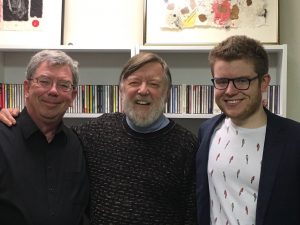
William Baker, Sir Andrew Davis, and Ed Frazier Davis
“He has established himself as a very significant young composer,” Sir Andrew said, by way of summary. “He’s producing works that are very accomplished, but which also say something that is uniquely him.”
For the moment, Ed is just trying to make a living composing and singing (he is a paid soloist at St. Andrew’s Episcopal Church), which is no easy task these days. “I’m making enough, because in addition to those things, I also sometimes drive for Uber. … The thing that makes the most money is composing, but commissions come in short bursts.”
It’s not just his father and William Baker who believe in Ed: His name is becoming known around the United States, and requests for new pieces are rolling in. Recent commissions include one from the Lyric Opera of Chicago for a “curtain opener” to pair with Beethoven’s Ninth Symphony, as part of his father’s farewell to the Chicago company in 2021. “Ed has found a way to be true to himself, to be true to what he hears in his ears and his mind and his soul,” Sir Andrew said. “Nothing is totally sure in this business, of course … but I think he’s found a very sure path.”
The Music of Ed Frazier Davis: The Kenneth Babcock Memorial Concert is on March 6th at the Kauffman Center’s Helzberg Hall. It includes four works performed by the William Baker Festival Singers (Music, Thou Queen of Heaven, My Beloved Spoke, Set Me as a Seal, and Swing Down, Chariot); three by the William Jewell College Concert Choir and conductor Anthony Maglione (Ubi Caritas, Yearning to Breathe Free, and How Can I Keep from Singing); O Magnum Mysterium by both choirs, conducted by Ed Frazier Davis; and the Hymn to Saint Cecilia (featuring soprano Sarah Tannehill Anderson) and Seven Last Words from the Cross), both conducted by Sir Andrew Davis. For tickets to the March 6th concert call 816-994-7222 or go to kauffmancenter.org. For more information about the composer and his works, visit efdavis.com.
To reach Paul Horsley, performing arts editor; send an email to paul@kcindependent.com or find him on Facebook or Twitter.